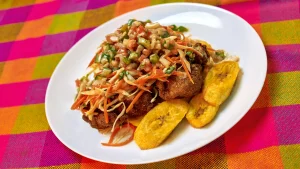Municipality of Patuca
Patuca is a municipality in the department of Olancho in Honduras.
Patuca was designated as a municipality on May 29, 1992, during the presidency of Rafael Callejas. Its founder, Mr. Joaquín Rosales Barralaga, served as a congressman at the time.
In the 1960s, Mr. Rosales lived in the municipality of San Francisco de la Paz (Olancho), his place of origin, where he was involved in coffee production and cattle farming. Patuca was inhabited by the Miskito tribe. There were no roads, and the paths were narrow, which made the journey to its administrative center, Juticalpa, take around ten days or more.
Fascinated by the idea that there was gold in the waters of the Patuca River, Mr. Joaquín Rosales traveled to that area and invited three friends, one of whom was his cousin, Julio Zúñiga. However, their first trip was unsuccessful as their food supplies sank into the depths of the Patuca River. Nevertheless, this did not diminish his desire to return and settle in these lands that had captivated him with their beauty.
Two years later, after several attempts, he returned to stay. He lived among the local tribes, and although some residents from nearby areas attempted to claim land, they were prevented from doing so by these tribes.
Years later, with the agricultural resettlement supported by the National Agrarian Institute (INA), some landowners settled in the area, aware of its fertile land suitable for livestock and agriculture. The only person they did not encroach upon was the charismatic leader, Joaquín Rosales.
Joaquín Rosales provided milk to the tribes and settlers who had migrated from southern Honduras. Livestock farming was introduced to the area by the municipal leader and other settlers who believed in the future prosperity of Patuca.
Due to his intelligence and determination, Joaquín Rosales was able to claim over 1,500 hectares of land in the region, becoming the wealthiest man in the municipality of Patuca and providing employment to many individuals and their families who settled on the newly discovered lands.
Years later, he served as a congressman in the National Congress during the tenure of Lic. Rafael Leonardo Callejas, leaving behind significant contributions to Patuca, such as the Municipal Palace, the Municipal Market named in his honor, the state-owned company Hondutel, and the school named after his uncle «Salatiel Rosales.» All that exists in Patuca today is the result of the brave and persistent efforts of this man who brought life to the newest municipality in the department.
Patuca has a land area of 635.10 square kilometers. Its name comes from its proximity to the river of the same name, which means «place of gambling» in the native language. It is the most recently established municipality in the department of Olancho. Its current population consists of migrants from the southern region of the country who arrived in the 1970s and 1980s as part of the agricultural resettlement process promoted by Caritas Honduras and supported by the National Agrarian Institute (INA). The estimated population of Patuca is currently 40,667 inhabitants. Over the years, Patuca has experienced rapid growth in agriculture, livestock farming, and significant social investment.
In 2002, a radio station called Radio Maravilla, founded by Omar Mejía, began its operations. It was a local radio station that only functioned for a few months. Later, the station returned but under a different name.
This new radio station was named Radio Nueva Palestina 1160 AM, also founded by Omar Mejía, and it came back with more power. It is a relic, as it was the only radio station that started from scratch. It operated with cassette tapes, without a computer or a mixer. It was the initiative of a determined farmer who had the idea of founding a sound station.
Radio Palestina is still the pioneering radio station today, as it is the only AM radio station in the area and also the most powerful. Its signal reaches all of Patuca, Juticalpa, Catacamas, Trojes, El Paraíso, and even communities in Nicaragua. Its programming is tailored to older people, featuring nostalgic music, Gruperas, Ranchera, and string music, which makes it timeless. Radio Palestina is a treasure of Patuca, as it has grown and developed alongside the municipality.
Today, Patuca is the location where the largest dam in Honduras is being constructed, an ambitious project carried out by a Chinese company that provides employment to many people in the area. Patuca is also emerging as a tourist destination, with some entrepreneurs already investing in hospitality to serve the many visitors who come to the area to see the Patuca 1, 2, and 3 dams.
Economy
Its main activities include cattle production and marketing, basic grain cultivation, and timber trade. Although the forests in the area have been depleted, timber is still extracted from the municipality of Catacamas. Other agricultural products cultivated include cassava and malanga (with the latter being mainly exported to the United States, Canada, and Europe). The area also produces dairy products, such as milk and artisanal cheeses.
Education
- The «Oriental Nueva Choluteca» Institute, an official institution (financed by the State), was later founded on April 15, 1991, by the initiative of the then-deputy for the Department of Olancho and founder of the municipality, Mr. Joaquin Rosales. It was named the «Salatiel Rosales Institute» in memory of the poet of the same name, who was also the late Mr. Rosales’ uncle and a native of San Francisco de la Paz Municipality. During his term as deputy, the late Mr. Rosales founded a municipal market that bears his name. He also brought the state-owned company Hondutel to this municipality, which was forgotten in the depths of a forested area with impassable roads. The current Municipal Palace was also constructed by this man committed to bringing development to the area.
- The «Rafael Pineda Ponce» School (located in the Municipal seat formerly known as Nueva Palestina). Currently, the institute has its own premises, computer laboratories, natural science laboratories, a home economics workshop, and additional land where students pursuing the Technical-Professional Baccalaureate in Agroindustry carry out their laboratory practices. The institute offers educational programs in the following modalities: Common Cycle, Commercial Education, Science and Literature Baccalaureate, and Technical-Professional Baccalaureate in Agroindustry. The latter program, which had its first graduating class in 2011, implements the «Learning by Doing» methodology.
- The Official Institute is located in the community of Terrero Blanco and offers Common Cycle and Commercial Education to the population in that part of the municipality. Meanwhile, the private institute known as «Center for Distance Education of Patuca» (CEDISPA), started operating in the second week of June 2008.
The municipality also has five Basic Education Centers located in the villages of: «La Laguna, El Ocotillal, La Libertad, Arenas Blancas, and Nueva Apacilagua.» These centers provide education up to the ninth grade or Common Cycle of General Culture.


